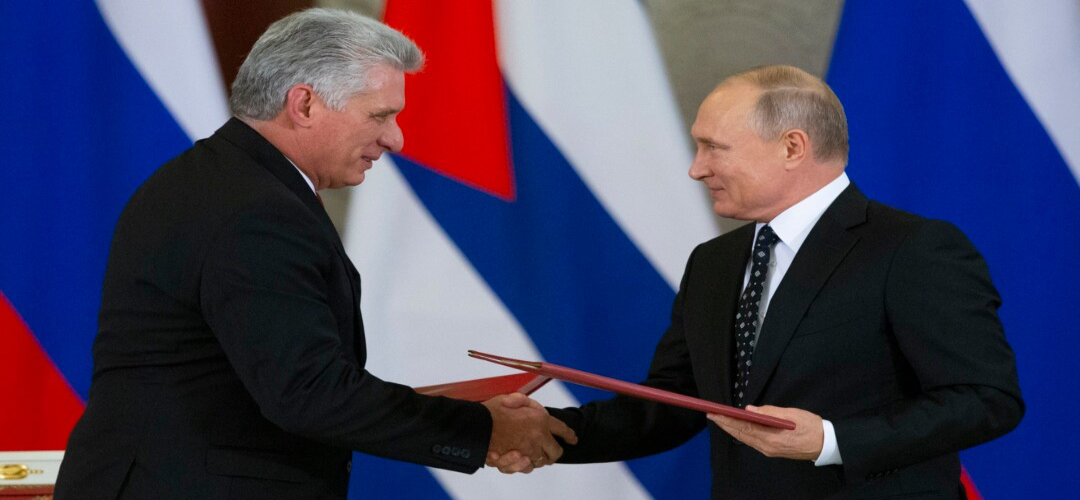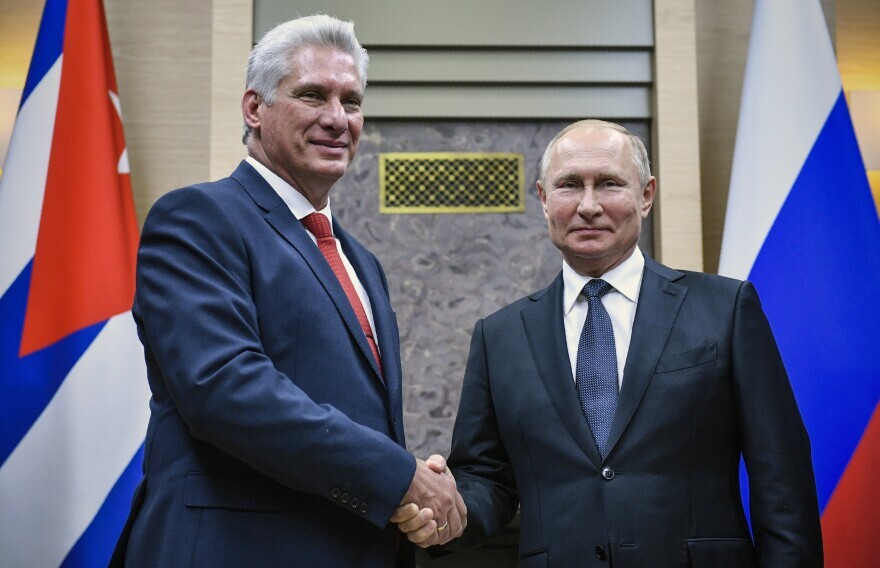Dancing the Tango, Again?
October 14, 2023 | Expert Insights

Earlier this year, longstanding allies Cuba and Russia signed a series of deals to increase trade, investment, and economic cooperation, united in their fight against U.S. sanctions.
Cuba looks up to its decades-old benefactor to pull it out of its economic crisis yet one more time.
The recent deals set plans to boost sugar and rum production in Cuba and revive tourism. Russia has also agreed to ensure wheat and oil supplies to the Caribbean nation. Further, Cuba offers preferential treatment to Russian investors in accessing Cuban property and an exemption from its import taxes, which is highly unusual for the Marxist regime in Havana.
Background
Relations between Russia and Cuba strengthened after the 1959 Cuban Revolution when Cuba turned communist under Fidel Castro. The two nations became close allies during the Cold War when the United States took harsh measures against Cuba, such as slashing its sugar quota to bring down the Castro regime. This pushed Cuba closer to the Soviet Union, which accepted all the sugar in return for oil. Cuba became economically dependent on the Soviet Union and received its military support.
As a Soviet proxy, thousands of Cuban soldiers fought in Angola and Mozambique during the 1980s, battling American proxies in full-scale conventional wars. The Soviet Union had gained an ally against the U.S., strategically located at its doorstep. This culminated in the high-stakes nuclear confrontation famously known as the 1962 Cuban Missile Crisis.
After the fall of the Soviet Union in 1991, trade between Cuba and Russia fell, including a significant reduction in oil exports from Russia, which played havoc with the Cuban economy. There was little enthusiasm in a weakened Russia to keep the flagging revolution in Cuba going when its own future appeared, at best, dismal.
However, as Russia grew in economic power and started rebuilding upon the vestiges of its global status, a gradual rapprochement began taking shape. This began with a renewal of their trade relationship and strategic partnership, including Russia securing rights to explore Cuba’s offshore oil reserves. Trade between the two countries tripled in 2022, and in the first four months of 2023, it went up to nine times compared to 2022.
Cuba has supported Russia strongly even as Moscow stands isolated globally for its invasion of Ukraine. Havana, under Miguel Díaz-Canel, the first secretary of the Cuban Communist Party (PCC), has exonerated Russia, blaming their common enemy, the U.S., for creating the conditions that led to war.
In the latest deal, in addition to the uncharacteristic import exemptions, Cuba has permitted Russian companies to use Cuban land for at least 30 years. This is particularly significant given the strict restrictions on land use in Cuba. Cubans have only recently been given limited property rights. Russian companies will have more access to land than Cuban citizens and companies have had since 1959.
The two countries are also looking to develop resorts in Cuba for Russian tourists, which would boost Cuba's tourism, which COVID majorly impacted-19. A joint rum company is also in the plan, which would contribute to reviving Cuba's lagging rum exports. In addition, Russia is providing finance and expertise to build a steel mill to revive construction in Cuba. Russia has assured supplies of wheat and oil to Cuba, which has struggled to meet its population's food and energy needs, leading to power cuts, tight rationing, and increased emigration out of Cuba. Once among the world's top sugar producers, Cuba has witnessed its sugar industry collapse to new lows. Cuba hopes to renew its sugar output through Russian collaboration in terms of investment, new equipment, input supplies like fertilizer, and specialized technology.

Analysis
Peopled by a hard-working, well-educated and talented populace, the Island nation desperately needs an opportunity to trade with the world and invite foreign investments, denied to it for almost six decades. At the heart of its deals with Russia lies the desire to pull its people out of their misery and stem the tide of refugees drifting across the ocean to the U.S. coast.
The communist Caribbean nation found no role to play in geopolitics after its withdrawal from Africa in the 1990s. Also, the Non-Aligned Movement (NAM), where Castro found a platform to project his tiny nation as a saviour of the oppressed colonies, was no longer relevant. While the NAM commemorated its 60th anniversary in a 2021 summit in Belgrade, it does not have a permanent secretariat, and many contend that it has all but faded away from the global landscape. India and Egypt are no longer 'Non-Aligned' in the true sense, and Tito's Yugoslavia has vanished from the maps of the world. But as the global world order reforms, Cuba sees an opportunity to find a niche, with a little push from Russia. These are trying times for Moscow, and an ally, however small and insignificant, is still welcome.
Cuba offers certain distinct opportunities- as an entry point into the Western Hemisphere through which Russia can extend its influence closer to Latin American nations like Venezuela, Nicaragua, Argentina, and Brazil. The U.S. would not be amused by such a move into an area it considers its backyard. As RUSI (a security think tank) and a New York Times article put it, increasing its influence in Latin American countries is also a way for Russia to counter NATO’s expansion in Eastern Europe.
Cuba's prosperity before its 1958 revolution was sustained by generous American investments in its tourist industry, buoyed by gambling and prostitution. Most of the sugar production was consumed by the U.S. Even today, a vast majority of Cubans dream of a day when their ties with their rich and powerful neighbour would be restored, and they could benefit from a mutually beneficial trade. Returning to the Russian fold would not improve the chances of any betterment of relations with Washington.
Excessive dependence on Russia could leave the Cuban economy lopsided and more vulnerable, apart from cramping its foreign policy choices. Trade between the two countries is imbalanced; most comprises Russian exports to Cuba. If the new plans are executed, and Russia later decides to withdraw its investment, companies, tourists, or imports from Cuba, the latter will have to bear the economic fallout. It could also increase public dissatisfaction in Cuba as Russian companies are given extraordinary property access on an island where land is at a great premium and its allocation stringently controlled by the regime. This sentiment has been echoed by the Centre for Strategic and International Studies, which has warned that embracing Russia could invite such retaliations from the U.S. that Cuba's floundering economy would not survive the blow.
Assessment
- The new slew of economic deals evidences greater cooperation between the two longstanding allies, Russia and Cuba. This collaboration offers Cuba a possible way to revive its staggering economy. Yet, it should also be wary of growing economically dependent on Russia and abandoning its relations with the West.
- For Russia, which is short of choices at this juncture, Cuba offers a way to rekindle an old alliance that helped it counter the U.S. in the past purely because of its geography. Moscow seeks the same advantage in the modern context to counter American pressure in Eastern Europe. Only time will tell whether it succeeds or not. For Cuba, the stakes are much higher.
- India has always had good relations with Havana, which went into hibernation as the global dynamics changed after the collapse of the Soviet Union. As a growing partner of the U.S. and an old ally of Moscow, New Delhi must closely watch the evolving situation in the Caribbean.








Comments